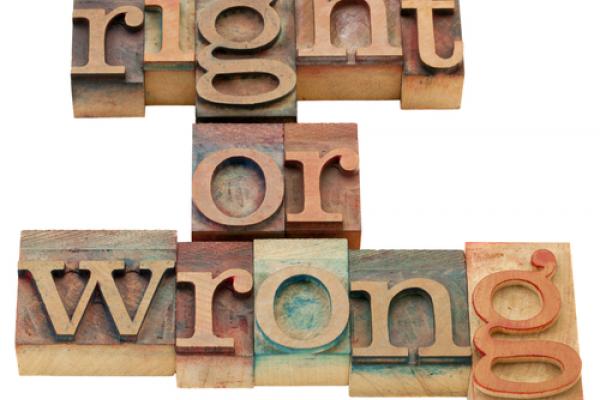“There can be no high civility without a deep morality" ~ R.W. Emerson
“Why can’t we all just get along?” ~ Rodney King
Some of the most heated conversations I have ever participated have been with other people of faith whom I sincerely believe want the same things I want, worship the same God that I worship, and labor as hard as I do to promote human flourishing.
During this election time, we have come to expect the rhetoric to replace reason and civility is a term that has no place in our discourses. Our disagreements are often not cognitive disagreements, but differences in morality and decency. This is why they take a personal tone that is easily offended and strongly defended.
It is interesting that modern psychologists have demonstrated that our understanding of morality is actually not as easy as “right or wrong,” but rather based on five different axes or foundations. According to Psychologists Jonathan Haidt and Jesse Graham, each foundation contributes to our formation of how “right” or “wrong” an action is.
- Harm/Care: Does the act demonstrate care for and protection of others?
- Fairness/Reciprocity: Does the act suggest fairness, justice and equity?
- In-group/Loyalty: Does the act show loyalty, patriotism, and community?
- Authority/Respect: Does the act demonstrate respect to culturally significant groups, institutions and authority figures?
- Purity/Sanctity: Does the act debase Human or Divine dignity?
Our perception of something being wrong or right is not a simple summation of each axis where the decision is weighed by giving each foundation equal footing, but rather that we have developed, whether by nature or nurture, individually weighted foundations.
That is, some may feel that the leading factor in determining morality is the harm/care axis, while another may feel it is in the in-group/loyalty axis.
For instance, abortion, is a clear cut moral wrong for many who hold the purity/sanctity axis high. In fact, those who hold that axis high may not even understand how another person who holds the fairness/reciprocity axis high may support a women’s right to an abortion. Or a person who weighs the harm/care axis heavily may not understand the resistance to social welfare programs that a person who emphasizes the fairness/reciprocity foundation.
Isn’t this why seemingly good people with a commitment to better communities and a better world argue, fuss, and fight?
Here are a couple of principles that I think we do not reflect enough upon:
Jesus emphasized different foundations in different contexts instead of rigidly determining a morality based upon an ideology. Jesus’ flipping of the tables may have hurt another, but in that context the purity/sanctity axis is prioritized (the sanctity of the temple and the purity of worship are protected). Yet in other settings, Jesus focuses on the welfare of people over and against standards of purity (purposely being with people who are “unclean”).
There may be different priorities that are appropriate within different paradigms. For example, within oppressed groups, the authority/respect axis is often highly prized. So an action to a group or culture where that is highly weighed, must prioritize that in its effectiveness as well as how it will be understood morally.
No one axis or foundation is inherently greater or more important than the other. Each axis is a contextually different way of describing the moral good.
There is an absence of theological and Biblical research looking at contextual application of these foundations in Jesus’ life and ministry. Very little has been written about the ethics of Jesus as it regards to prioritizing each ethic/foundation in a specific context. It would be incredibly helpful in our discussion of some of the most polarizing issues of our day.
I hope that we can reflect upon these foundations of morality as we attempt to have productive, civil discourse on some of the most important issues of our generation and that these discussions can lead to greater understanding and a more meaningful unity for Christian advocates.
Dr. Michael Traylor is a pediatrician, child advocate and pastor of New Hope Free Methodist Church in Rochester, N.Y. He blogs at Virtual faith. Follow Dr. Traylor on Twitter @drtraylor.
Image: marekuliasz/Shutterstock
Got something to say about what you're reading? We value your feedback!
